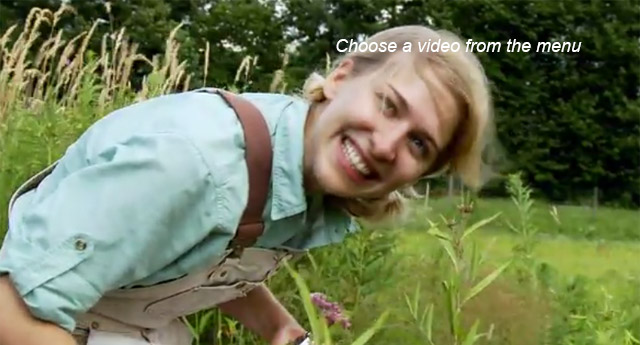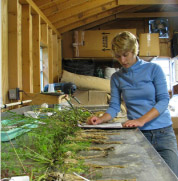Susan Cook Patton

Susan's Profile

1. What is the focus of your research?
I am interested in the importance of plant diversity. For an ecologist, diversity means the number of different species in a community. A lot of research shows that communities with many species are healthier than those with just a few species. You may wonder what a healthy community looks like. Well, diverse plant communities usually produce bigger plants. Bigger plants mean more food and shelter for insects and other animals that live in those communities. Diverse plant communities are also more stable. Even if one species is having a bad year, there will be other species around to keep growing and supporting the ecosystem. Diverse plant communities also get fewer diseases and insect pests. Diverse communities are better for humans too!
This research is important because plant diversity is changing. Some species that lived in New York for many, many years are disappearing. Other species that never lived here are moving in from Europe and Asia. A third of the species you see in fields around New York are new arrivals! Some of these new species are invasive, meaning they harm the environment by pushing out other species. My research asks, does it matter that we are losing some species and gaining others? And, why does it matter?
2. What got you interested in this line of research?|
There is a bike path close to where I grew up in Ohio. The path travels through the woods and follows along the Little Miami River. On Sunday mornings, my dad and I would bike along this path. During our rides I would try to name all the plant species I saw. Sometimes we would see invasive species like Lesser Celandine or Periwinkle covering an entire hillside. My dad would ask, “What is that beautiful plant? I’d like to plant it in my garden.” I would respond, “No Dad, you can’t plant that one, that one is an invasive species!” He would answer, “The landscape is changing! What is wrong with a plant that grows well?”
His comments have stuck with me. The landscape is changing. We are turning forests and fields into malls and suburbs. We are losing species that have been here for thousands of years. We are gaining new species and some of those new species are invasive. I am interested in understanding the consequences of all of these changes.
3. Where did you grow up, and how does this relate to what you are doing now?
I grew up in the suburbs. The “wild” places of my childhood were scrappy bits of forests and farms. In my mind they were uncharted territories to explore. Some people find Nature in huge forests or big, open plains. I am used to finding Nature in smaller places like alongside a road or in my backyard. In high school and college, I started learning the names of species. Learning to tell species apart, opened my eyes to the diversity of life surrounding me. “Yellow flowers” became dandelions, wild parsnip, evening primrose, and lesser celandine. “Butterflies” turned into cabbage whites, meadow fritillaries, monarchs, and red admirals. I spent so much time outside as a kid that I fell in love with Nature. I went to graduate school to learn more about the diversity of life around me. Now, I get to study diversity everyday. I even get paid to sit in fields and search for the beautiful, weird, and creepy insects that live in diverse plant communities!
4. What do you like to do in your spare time?
There is never enough time for all the activities I want to do. I love to hike in the woods. Spring is a great time to hunt for flowers that bloom right after the snow melts. Fall is wonderful when the leaves are changing. In summer, I love to bike out in the countryside. I bike to exercise and because it is a great way to find seeds for experiments. In winter, a fresh snowfall makes me giddy to go cross-country skiing. I also have two dogs that want to go for a run any day of the year. At night, I sew and watch old black and white movies. I share good meals and play board games with my husband and friends. I also love to pick local fruits and vegetables. There is more homemade jam in my basement than I can eat because I always pick too many berries!
5. Why is it important for us to conserve biodiversity, and how does this relate to your career path?
John Muir once said, “When we try to pick out anything by itself, we find it hitched to everything else in the Universe.” He meant that most species are connected to each other. If you take away one species, then another species will feel the change. Ecologists are only just beginning to uncover these connections and meanwhile the world is changing. The climate is warming. Forests are being cut down. Species are moving around the globe. Some species, like deer, are becoming incredibly common. Other species are shrinking into extinction. Ideally, we would set aside large wilderness areas for future generations. However, there is a lot of land that humans have turned into cities, neighborhoods, malls, factories, and farms. I am interested in these places. Are there ways we can convert human spaces into more natural places? Can a lawn produce flowers for butterflies? Can hedgerows around farm fields be a home for beneficial insects and birds, and help keep crop-eating pests away? First, we need to understand how species interact with each other and their environment. Then, we can use that knowledge to help bring Nature back into human places. And the more people experience Nature, the more they will understand it, care for it, and want to conserve it.







